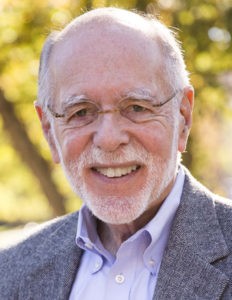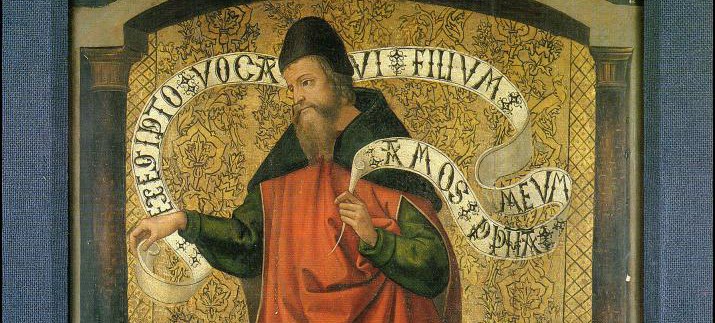I have spent 50 years teaching religion to mostly white evangelical students at Christian colleges and universities from California to Pennsylvania and points in between. Most of those students came from evangelical homes and grew up in evangelical churches, and most were — and are — abysmally ignorant of the biblical text.
For years, I have asked my students what they know about the book of Amos in the Hebrew Bible. This tiny book has inspired virtually every Christian advocate for social and racial justice for centuries on end. It inspired Ida B. Wells and Frederick Douglass in the 19th century, Martin Luther King Jr. and Fannie Lou Hamer in the 20th century, and in our time John Lewis, William Barber III, and the scholar-activist Catherine Meeks, to name just a few.

Richard T. Hughes
But when I ask my students about Amos, no hands go up. Instead, their eyes register goose eggs. They have no idea. They’ve never read it and know nothing about it.
That experience, repeated year after year after year, has told me much about the biblical illiteracy that reigns in the churches from which these students come.
It also helps solve the riddle of why 81% of white evangelical Christians still support Donald Trump, a man whose life, values and policies stand in such contrast to the teachings of Jesus.
The chief reason they support him seems obvious: Trump has sworn to defend them, promote their agenda and restore the cultural power they once enjoyed. In return, many white evangelicals worship Trump.
The question that begs for an answer is this: What happened to the guardrails that might have kept them true to their own prophetic faith?
There are three of those guardrails — a serious engagement with the biblical text, a knowledge of Christian history, and critical thinking — all of which white evangelicals have, for the most part, abandoned.
Of those three, the most important by far is the biblical text, and especially the teachings of Jesus.
“White evangelicals seem not to know — and perhaps not to care — that Jesus’ favorite topic was ‘the kingdom of God.'”
White evangelicals seem not to know — and perhaps not to care — that Jesus’ favorite topic was “the kingdom of God,” a kingdom that turns conventional values upside down. If you want to save your life, you must lose it, Jesus said, and if you want to be first, you must be last.
They seem not to know — and perhaps not to care — that in the kingdom of God, Yahweh always stands with the oppressed against the oppressor.
They seem not to know — and perhaps not to care — that in the kingdom of God, there is no room for a world where children are caged, systemic poverty goes unaddressed, and Black and brown bodies are always at risk.
They seem not to know — and perhaps not to care — that the Bible paints only one panoramic picture of the final judgment. It appears in Matthew 25, where only one criterion determines who enters the kingdom of God and who does not. That criterion is how we treat the hungry, the naked, the homeless, those in prison and the stranger — those Jesus called “the least of these.”
And they seem not to know — and perhaps not to care — that in the realm of power politics, the kingdom of God is always upside down. “The rulers of the Gentiles lord it over them, and their great men exercise authority over them. It shall not be so among you,” Jesus said, “but whoever would be great among you must be your servant.”
When they do read the Bible, most white evangelicals read it through a lens that completely obscures Jesus’ emphasis on the kingdom of God.
“The lens of American nationalism helps conflate the kingdom of God with the United States of America, robbing it of its counter-cultural power.”
The lens of American nationalism helps conflate the kingdom of God with the United States of America, robbing it of its counter-cultural power.
The lens of American individualism helps them imagine the gospel in exclusively private terms, robbing the kingdom of God of its focus on the common good.
The lens of whiteness obscures people of color, enabling white evangelicals to whitewash the kingdom of God.
And their exclusive fixation on the world to come obscures the kingdom’s focus on poverty, injustice and oppression in the here and now.
Once white evangelicals have squeezed the kingdom of God out of the biblical text, they are left with little more than a cartoonish caricature of Jesus and the ethic he taught, a caricature that routinely shows up on signs in front of their churches — signs like “Warning: Exposure to the SON may Prevent Burning” (Indiana), “Ketchup with Jesus & Relish His Love” (Idaho), or “God Bless America — Land that He Loves” (Tennessee).
The biblical ignorance that reigns in the white, evangelical world is matched only by ignorance of Christian history. If they knew their history, they would know that when Christians have welcomed secular rulers as defenders of their religion, they always have surrendered the integrity of the Christian faith.
When Constantine the Great became protector and defender of the Christian religion in the early fourth century, a counter-cultural movement devoted to a radical Jesus became an imperial church — a church that would serve imperial interests for well more than a thousand years. And as white evangelical Christians embrace Donald Trump — or any secular ruler — as defender of the faith, they turn their backs on the counter-cultural kingdom of God.
Finally, a book published a quarter-century ago pointed to another guardrail that white evangelicals would abandon over time. That book was Mark Noll’s The Scandal of the Evangelical Mind, whose opening sentence says it all: “The scandal of the evangelical mind is that there is not much of an evangelical mind.” Noll lamented then that evangelicals have “largely abandoned the universities, the arts, and other realms of ‘high’ culture.”
Today, the “scandal of the evangelical mind” includes not only failure to seriously engage the biblical text or know history. It also includes failure to engage in critical thinking. That failure helps explain why they so often take blatant and demonstrable falsehoods for objective truth, why they fall prey to conspiracy theories, and why they so readily imagine that demonstrable good is really evil and demonstrable evil is really good.
Having lost their cultural dominance, white evangelical Christians in the United States now live in a perfect storm — a storm defined by their ignorance of the biblical text, their ignorance of Christian history, and their loss of any significant measure of critical thinking.
And having abandoned all those constraints, it is little wonder that 81% of those Christians still pay homage to a man who promises to defend and exalt them, even as that man promotes policies that exalt the rich, that undermine impoverished and marginalized people, and that stand opposed to Jesus’ teachings on the kingdom of God.
Richard T. Hughes, author of Myths America Lives By: White Supremacy and the Stories that Give Us Meaning, is distinguished professor emeritus at Pepperdine University and Messiah College.

